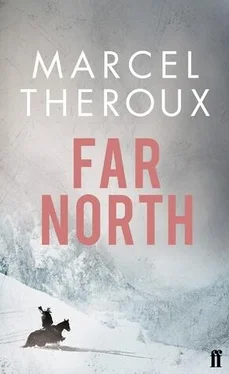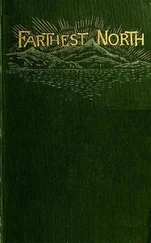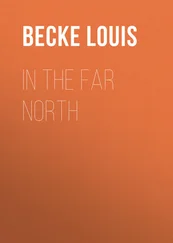Levanevskii’s plane was like a boast from on high, it was the white people saying, look what we can do! And everyone likes to see a braggart humbled.
The story seemed to tell the Tungus what they knew from their own lives, and from dealing with people like me, the remnant of the other way of doing things: time has a way of evening things out, the simple ways endure, and the fancy pants with his smart new way falls by the roadside. The best way to tell how long a thing will last is ask how long it’s been around for. The newest things end soonest. And things that have been around for a good long while will last a while to come.
Those herders took it in the neck for years from people who claimed to be better, know more. From the little I know of history, I understand that their holy men got killed, and their villages broken up, and their ways of doing things beaten out of them, all in the name of progress. So if they came across a trifle smug in telling their story, you can understand it.
But whenever I hearhat story I felt something different. I thought: what a piece of work man is! What can’t we do when we have a mind to? I feel a kind of awe at my ancestors, living surrounded by more kinds of knowledge than will fit inside any one man’s head. You can say, as the herders do, that they overcomplicated their lives and that made them weak. Or you can just marvel at their ingenuity and hope that what they did once can be done once more.
When I came to, the woods were burning, and my eyebrows and a good part of my hair had been singed off. My collar bone was broken, and I could hardly hear on account of going deaf from the boom.
I lay on my back in a pile of brush watching a plume of black smoke coil into the sky, masking the stars as it went up, and I thought: glory, hallelujah, we’ve come again.
*
The woods burned for three days, and it was almost a week before I was able to get anywhere near the wreck. By then there wasn’t much at all to see: a skeleton of blackened metal, propellors, a few charred boxes that had been tossed into the air from the blast and damn nearly taken my head off.
The heat had been so fierce it was hard to say how many people the plane had been carrying, but I guessed five or six. I buried what I could find at the approach to the woods so animals wouldn’t get at the bones, and marked the place with a simple cross that I pounded into the ground with a rock.
When I reflected on it, it seemed to me that the best monument to those people was the plane they had died in. I knew I had never seen anything so beautiful, in all my years, as that plane arcing through the sky over the valley.
I’m not superstitious, but I took it as a kind of sign, from god, or the gods, or the ancestors, or whoever is up there, not to abandon myself to my despair. It does seem strange to take comfort from death and disaster, but the appearance of the plane in the sky told me I was no longer alone. The people who flew in her had died, but I knew she must have been built somewhere, that someone had fuelled her, prepared her for her journey through the air. Of course, I still mourned Ping and the child, but whereas I’d thought that the three of us were the last of the old world I’d cared about, it seemed now that there was more than a remnant of that world out there, working as it ought to, as it had in the past, performing its miracles, putting men and who knew what else in the air, and I set my heart on finding it.
SINCE THE PLANE was flying roughly west when it went down, my first thought was that it had been sent out of one of the cities between here and the Bering Sea. Five had been built during the waves of settlement that had brought my parents from Chicago: Plymouth, New Providence, Homerton, Esperanza, and Evangeline — the first to be settled and the farthest west by some two hundred miles.
I felt certain that one of them had scraped up fuel and a plane and gone to scout out the others. In that position, I’d have done the same. There was me, so there might well be more than me: Makepeaces all over, still scratchin out a solitary life, longing for contact, but afraid to move, like a person lost in a wood, in case they miss the search party when it comes.
There’d been no word between the towns for years. Even at the best of times, the links between us were slender. The settlers were inward-looking on principle. They didn’t come here to be social, or to recreate the bustling trade and business of the world they’d left behind. But even so, there was a sense of cousinhood with the other cities. They were the closest we had to a nation.
*
My father used to say he decided to leave America when he noticed that the poor had all begun to look alike.
He didn’t mean their faces, and he didn’t mean only the poor of the United States. He meant poor people everywhere.
It stands to reason that the poor of each country should differ more from each other than other men do. Their roots are in the soil. What they eat, how they dress, their homes, their customs — all grow out of the ground. Thatch, palm, or caribou skin. Rice, wheat, or manioc. Fur, cotton, or worsted. Their whole lives are fixed by the character and habits of the land.
He said it hit him travelling one time in the year or so before he met my mother. Whatever country of the world it was — Persia, Siam, or the Indies, Europe or the South Seas, or Mesopotamia — the poor were starting to look alike, live alike, eat alike, and dress alike in the same kind of clothes all made in the same part of China.
To him, it was a sign that the people had got severed from the land. I can’t say if he was right or wrong. By the time I was old enough to take an interest in his world, it was already passing away.
He liked to say that ever since we slid out of the primeval mud on our bellies, we had been shaped by scarcity. Whatever you took: cheese, churches, good manners, thrift, beer, soap, patience, families, murder, fences — it had all come about because there was never enough, sometimes not quite enough, and sometimes not nearly enough, to go round. The story of the mass of humanity was the story of people struggling and failing to get the wherewithal for life.
The pain of that struggle taught people forbearance.
And yet my father said he was born into a world of abundance. It was a world upside down, in which the rich were skinny and the poor were fat. In one single day of his youth, there were more people alive on earth, than had lived on it in all the years since Noah parked his boat on Ararat.
You don’t need to be any more than normally superstitious or even a Bible reader to guess that lean years will follow fat ones. Milliards of people who want feeding will make a rumble that shakes the planet. But my father’s concerns weren’t practical ones. He believed that one way or another, these people would be fed, but that the price of this abundance was an impoverished spirit. He wanted to turn his back on a world that he felt was debased and graceless.
It must have been strange for the Tungus to think anyone looked at their difficult lives with envy. But men and women like my father dreamed of quitting their cities, putting fresh roots in the soil and growing up again in the patched, handmade world of their ancestors. They chose that instead of — instead of w I don’t know — whatever dreams of speed, and glass, and luxury drive men who know they will never go hungry.
In centuries before, they would have obtained a warrant from a king and set sail to found a colony in some emptier place. But the earth was full. There was no place to start again. Even the moon had a flag on it in those days.
I believe Siberia was suggested to them as a joke. People thought of the place as a land of ice, a desert of rocks and snow, with the wind blasting it ten months a year from the Urals to the Pacific Ocean. Lucky for us they did.
Читать дальше












